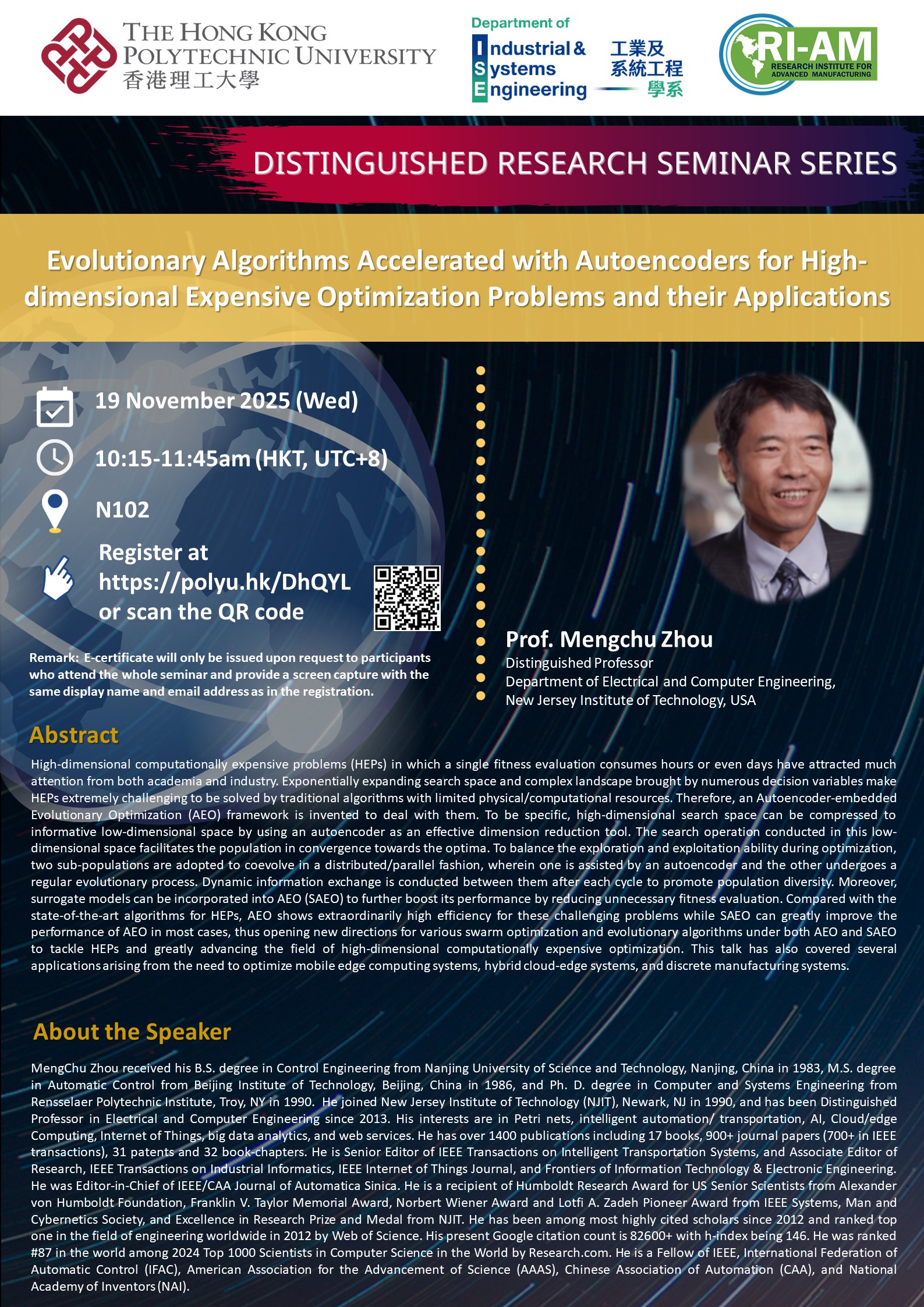Evolutionary Algorithms Accelerated with Autoencoders for High-dimensional Expensive Optimization Problems and their Applications
Distinguished Research Seminar Series

-
Date
19 Nov 2025
-
Organiser
Department of Industrial and Systems Engineering, PolyU
-
Time
10:15 - 11:45
-
Venue
N102
Speaker
Prof. MengChu Zhou
Remarks
If you have enquiries regarding E-certificate after the seminar, please contact david.kuo@polyu.edu.hk.
Summary
High-dimensional computationally expensive problems (HEPs) in which a single fitness evaluation consumes hours or even days have attracted much attention from both academia and industry. Exponentially expanding search space and complex landscape brought by numerous decision variables make HEPs extremely challenging to be solved by traditional algorithms with limited physical/computational resources. Therefore, an Autoencoder-embedded Evolutionary Optimization (AEO) framework is invented to deal with them. To be specific, high-dimensional search space can be compressed to informative low-dimensional space by using an autoencoder as an effective dimension reduction tool. The search operation conducted in this low-dimensional space facilitates the population in convergence towards the optima. To balance the exploration and exploitation ability during optimization, two sub-populations are adopted to coevolve in a distributed/parallel fashion, wherein one is assisted by an autoencoder and the other undergoes a regular evolutionary process. Dynamic information exchange is conducted between them after each cycle to promote population diversity. Moreover, surrogate models can be incorporated into AEO (SAEO) to further boost its performance by reducing unnecessary fitness evaluation. Compared with the state-of-the-art algorithms for HEPs, AEO shows extraordinarily high efficiency for these challenging problems while SAEO can greatly improve the performance of AEO in most cases, thus opening new directions for various swarm optimization and evolutionary algorithms under both AEO and SAEO to tackle HEPs and greatly advancing the field of high-dimensional computationally expensive optimization. This talk has also covered several applications arising from the need to optimize mobile edge computing systems, hybrid cloud-edge systems, and discrete manufacturing systems.
Keynote Speaker

Prof. MengChu Zhou
Distinguished Professor
Department of Electrical and Computer Engineering,
New Jersey Institute of Technology, USA
MengChu Zhou received his B.S. degree in Control Engineering from Nanjing University of Science and Technology, Nanjing, China in 1983, M.S. degree in Automatic Control from Beijing Institute of Technology, Beijing, China in 1986, and Ph. D. degree in Computer and Systems Engineering from Rensselaer Polytechnic Institute, Troy, NY in 1990. He joined New Jersey Institute of Technology (NJIT), Newark, NJ in 1990, and has been Distinguished Professor in Electrical and Computer Engineering since 2013. His interests are in Petri nets, intelligent automation/ transportation, AI, Cloud/edge Computing, Internet of Things, big data analytics, and web services. He has over 1400 publications including 17 books, 900+ journal papers (700+ in IEEE transactions), 31 patents and 32 book-chapters. He is Senior Editor of IEEE Transactions on Intelligent Transportation Systems, and Associate Editor of Research, IEEE Transactions on Industrial Informatics, IEEE Internet of Things Journal, and Frontiers of Information Technology & Electronic Engineering. He was Editor-in-Chief of IEEE/CAA Journal of Automatica Sinica. He is a recipient of Humboldt Research Award for US Senior Scientists from Alexander von Humboldt Foundation, Franklin V. Taylor Memorial Award, Norbert Wiener Award and Lotfi A. Zadeh Pioneer Award from IEEE Systems, Man and Cybernetics Society, and Excellence in Research Prize and Medal from NJIT. He has been among most highly cited scholars since 2012 and ranked top one in the field of engineering worldwide in 2012 by Web of Science. His present Google citation count is 82600+ with h-index being 146. He was ranked #87 in the world among 2024 Top 1000 Scientists in Computer Science in the World by Research.com. He is a Fellow of IEEE, International Federation of Automatic Control (IFAC), American Association for the Advancement of Science (AAAS), Chinese Association of Automation (CAA), and National Academy of Inventors (NAI).
You may also like















